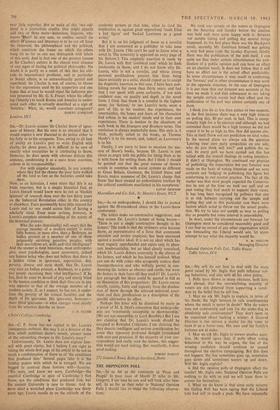Stu,—C. P. Snow has not replied to Dr. Leavis's intemperate
outburst. But may I, as a director of the firm which publishes Snow's novels, answer some of the astounding charges in Dr. Lcavis's essay? Unfortunately, Dr. Leavis does not express him- self with great clarity, but I believe I, am right in taking the whole first page of his article to be not so much a condemnation of Snow as of 'the conditions that produced him.' Several pages later it is the Sunday papers with which he is enraged. We are begged to contrast these horrors with—Scrutiny. ('We were, and knew we were, Cambridge—the essential Cambridge in spite of Cambridge.') Not Snow, not the conditions that produced him, but the ancient University is now to blame. And to show what a wretched place Cambridge was thirty years ago, Leavis recalls to us the attitude of the
academic powers at that time, when he (and the implication is, against great opposition) 'made Eliot a key figure' and 'backed Lawrence as a great writer.'
But it is on his judgment of Snow as a novelist that I am concerned as a publisher to take issue with Dr. Leavis. ('He can't be said to know what a novel is. The nonentity is apparent on every page of his fictions?) This emphatic assertion is made by Dr. Leavis with that 'confident ease' which he finds intolerable in Snow, and I do not know why Dr. Leavis, who is not a novelist, and whose strong personal predilections prevent him from being taken seriously as a critic, should expect us to accept his dogmatic assertion in this case. I have been pub- lishing novels for more than thirty years, and feel that I can speak with some authority, if not with confident ease, on quality and depth in the novel form. I think that Snow is a novelist in the highest sense; his 'fictions,' to use Leavis's term, seem a part of life to his readers; the experiences, the uncertainties, the hopes and fears of his characters find echoes in his readers' minds and in their own experiences. There is tension in the situations of each book in the Strangers and Brothers series. The resolution is always masterfully done. The style is, I think, perfectly suited to the books, as Thomas Hardy's is to his novels, and, indeed,' as Lawrence's is to his.
Finally, I am sorry to have to mention the suc- cess of Snow's books, because Dr. Leavis is just about as angry with the public for liking them as he is with Snow for writing them. But I think it should be pointed out that the great success of Snow's novels in countries with social systems as different as Great Britain, Germany, the United States and Russia makes nonsense of Dr. Leavis's charge that Snow 'has been created an authoritative intellect by the cultural conditions manifested in his acceptance.'
LOVAT DICKSON Macmillan and Co. Ltd., St. Martin's Street, WC2














































 Previous page
Previous page